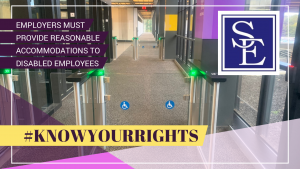New Jersey law provides for strong protections for disabled employees who suffer discrimination at the workplace. What is widely considered as on the most powerful anti-discrimination laws in the country, the New Jersey Law Against Discrimination bars discrimination of individuals based on protected characteristics in the terms and conditions of employment. The law specifically prohibits discrimination based on an employee’s disability or perceived disability and requires employers to engage in an interactive process in order to determine whether a reasonable accommodation can be provided to employees with a disability. What exactly this process and the resulting accommodations may consist of has been established by various court case rulings since the law’s passing in 1945.
Tynan v. Vicinage 13 is a landmark disability discrimination and failure to reasonable accommodated case that was decided in 2002 by a New Jersey Superior Court in the Appellate Division. The plaintiff employee in this case was employed by Vicinage 13 of Superior Court as the Hunterdon County Jury Manager. She suffered from a combination of physical and mental disabilities including migraines, Post-Traumatic Stress Disorder, depression, irritable bowel syndrome, and hypertension. The plaintiff claimed that these disabilities were exacerbated by harassment and mistreatment from her supervisor at Vicinage 13. On multiple occasions, her supervisor issued disciplinary actions against Ms. Tyan for minor oversights and threatened to terminate her employment regularly. The stress caused by the severe treatment and allegedly hostile work environment exacerbated Ms. Tynan’s disabilities and caused her to become sicker, both mentally and physically. Ms. Tynan complained formally to the Assistant Trial Court Administrato and the court’s Human Resources Division, describing her disabilities, the supervisor’s behavior, and a need for accommodations. Tynan was provided with a plan to remedy the situation involving processes of mediation between her and her supervisor.
Shortly after this plan was created, Ms. Tynan’s exacerbated medical conditions caused her to require a leave from her employment with Vicinage 13. She was approved for family leave and planned to return approximately 11 months later. During this leave, Ms. Tynan received treatment for various disabilities, particularly for her depression and hypertension. Her treating physicians recommended that Ms. Tynan continue her leave from Vicinage 13, and that it would be important for her to report to a different administrator upon return as a result of the extreme stress that Pardo’s treatment caused Ms. Tynan. At the end of her planned family leave, Ms. Tynan requested additional time off and to report to a different administrator upon return. The employer denied both of these accommodations and told Ms. Tynan that if she did not report to work immediately, she will be considered to have resigned from her position. Ms. Tynan could not return to work as a result of her disabilities and was effectively terminated from her position with Vicinage 13.
Following this unlawful termination, Ms. Tynan filed a complaint alleging disability discrimination. In this complaint, Ms. Tynan argued that her former employer had neglected to engage in an interactive process to reasonably accommodate her disabilities. The trial court dismissed her complaints, and she appealed.
The Superior Court affirmed the trial court’s dismissal of several of Ms. Tynan’s complaints, including her claim that she was subject to a hostile work environment and intentional infliction of emotional distress. However, the Superior Court agreed that Ms. Tynan’s claim that her employer failed to accommodate her disability needed a closer analysis. The court explained:
“To show that an employer failed to participate in the interactive process, a disabled employee must demonstrate: (1) the employer knew about the employee’s disability; (2) the employee requested accommodations or assistance for her disability; (3) the employer did not make a good faith effort to assist the employee in seeking accommodations; and (4) the employee could have been reasonably accommodated but for the employer’s lack of good faith.”
The Vicinage argued that Ms. Tynan failed to request an accommodation for her disability, stating that disabled employees must make specific requests advising their employers of exactly what accommodations they seek. The Superior Court denied this argument. They instead held that employees need only “make clear that…assistance is desired for his or her disability.” The court further held that a request for accommodations needn’t be in writing. Instead, once an employer is notified of the disability and a desire for accommodations, even if this notification is informal, it becomes the responsibility of the employer to implement the interactive process to determine if a reasonable accommodation is possible.
Ms. Tynan notified several supervisors of her disabilities and belief that they were exacerbated by working with her supervisor. She expressed her desire for a variety of accommodations, including an extended medical leave, the ability to report to a different supervisor, and a transfer to a different position. Instead of investigating the possibility of such accommodations, Vicinage 13 terminated Ms. Tynan’s employment. As the court states, “[A]n employer who acts in bad faith in the interactive process will be liable if the jury can reasonably conclude that the employee would have been able to perform the job with accommodations.” As a result of the aforementioned facts, the Appellate Court held that Tynan’s failure to accommodate claim should not have been dismissed on summary judgment and should instead be determined by a jury.
The Tynan v. Vicinage decision continues to be frequently cited by New Jersey employment lawyers in cases of disability discrimination and failure to accommodate. The case remains an important example of the extent of the duty of employers to engage in good faith in an interactive process with a disabled employee prior to making a decision to terminate an employee because of a disability.
 New Jersey Employment Lawyers Blog
New Jersey Employment Lawyers Blog


